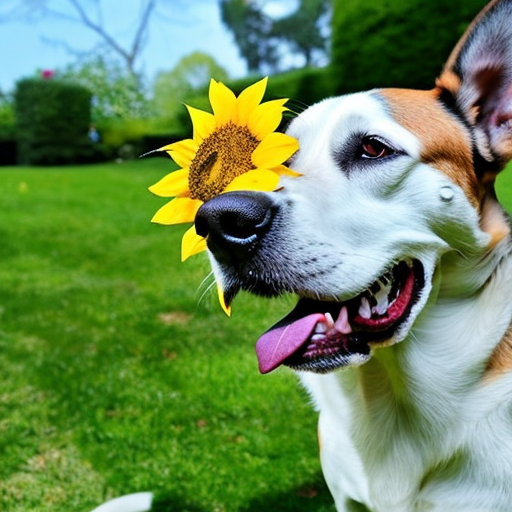- 1. Can Dogs Eat Sunflower Seeds?
- 2. Facts And Tips About Dogs Eat Sunflower Seeds
- 3. How much quantity of Sunflower Seeds should be given to Dogs?
- 4. Can I give my dog roasted sunflower seeds?
- 5. What are some other roasted sunflower seeds that I can give my dog?
- 6. How do I know if my dog is allergic to sunflower seeds?
- 7. How to save my dog from sunflower seed allergy?
- 8. Does sunflower seeds are the favorite food of dogs?
- 9. How can I keep my dog Healthy?
- 10. What are some other healthy snacks for dogs?
1. Can Dogs Eat Sunflower Seeds?
Yes, Dogs can eat sunflower seeds in moderation, but there are some precautions to consider. Sunflower seeds themselves are not toxic to dogs, and when given in small quantities, they can be a source of beneficial nutrients like vitamin E, protein, and healthy fats. However, it’s crucial to offer dogs eat sunflower seeds that are unsalted and shelled to avoid any potential health issues.
The high-fat content in sunflower seeds can lead to digestive problems, pancreatitis, or weight gain if consumed excessively. Additionally, the shells of sunflower seeds might be challenging for dogs to digest and could potentially cause gastrointestinal irritation or blockage if ingested in large amounts. Before incorporating sunflower seeds into your dog’s diet, it’s advisable to consult with a veterinarian to determine if it’s suitable for your dog’s individual health needs and to ensure proper portion sizes to prevent any adverse effects.
2. Facts And Tips About Dogs Eat Sunflower Seeds
• Sunflower seeds are rich in protein, fiber, healthy fats, and various vitamins and minerals, such as vitamin E, copper, selenium, and manganese. These nutrients can support your dog’s immune system, skin, coat, and overall health.
• However, sunflower seeds also contain a lot of calories and fat, which can lead to obesity and pancreatitis in dogs if consumed in excess. Therefore, you should limit the amount of sunflower seeds you give to your dog, and consult your veterinarian before adding them to your dog’s diet.
• The recommended serving size for dogs eat sunflower seeds is about 10 to 20 seeds for small dogs, and 20 to 40 seeds for large dogs, per week. You can use them as occasional treats or mix them with your dog’s food.
• You should only give your dog plain, natural, raw, or toasted sunflower seeds, without any salt, seasoning, or additives. Salted sunflower seeds can cause salt toxicity, which can result in dehydration, vomiting, diarrhea, seizures, and even death.
• Before dogs eat sunflower seeds, you should also remove the shells or husks of the sunflower seeds. The shells are hard and indigestible and can cause choking, intestinal blockage, or irritation in your dog’s mouth, throat, and stomach.
• You can also give your dog sunflower butter, which is a paste made from sunflower seeds, as long as it is unsalted and unsweetened. However, you should limit the amount to a spoonful once in a while, as it is very high in calories and fat.
How can your dog eat sunflower seeds safely:
Let’s say you have a medium-sized dog named Max, who weighs about 30 pounds. According to the guidelines above, you can give him up to 30 sunflower seeds per week, or about 4 to 5 seeds per day. You buy a bag of natural, unsalted, shelled sunflower seeds from the store. You check the label to make sure there are no other ingredients or additives in the seeds. You measure out a small handful of seeds, about 4 to 5, and put them in a bowl. You toss them lightly to make sure they are clean and dry.

You call Max over and offer him the bowl of seeds. He sniffs them curiously and then starts to munch on them. He seems to enjoy the nutty flavor and crunchy texture of the seeds. You praise him pet him, and then put away the rest of the seeds in a sealed container. You make a note of how many seeds you gave him and decide to skip his regular treat for the day, to balance out the extra calories and fat from the seeds.
You monitor Max for any signs of discomfort or adverse reactions, such as vomiting, diarrhea, or lethargy. You don’t notice any problems, and he seems happy and healthy. You repeat this process a few times a week, varying the days and times you give him the seeds, to prevent him from getting bored or expecting them. You also make sure he has plenty of fresh water and exercise to keep him hydrated and fit.
3. How much quantity of Sunflower Seeds should be given to Dogs?
The recommended amount of dogs eat sunflower seeds depends on their size, weight, and activity level. As a general rule, dogs eat sunflower seeds should be an occasional snack given in moderate amounts. Small dogs eat sunflower dogs and have 10 to 20 seeds a week, while large dogs can have 20 to 40 seeds a week. You should also limit the intake of sunflower butter, which is a paste made from sunflower seeds, to a spoonful once in a while. You should always consult your veterinarian about the diet of your dogs eat sunflower seeds, and adjust the amount according to their individual needs and tolerance.
By following these steps, you can safely share with dogs eat sunflower seeds, and provide them with some extra nutrition and enjoyment. However, remember that sunflower seeds are not a substitute for a balanced and complete dog food, and should only be given as occasional snacks in moderation. Always consult your veterinarian before making any changes to your dog’s diet, and if you notice any signs of illness or allergy in your dog after feeding him sunflower seeds, stop immediately and seek medical attention. Sunflower seeds can be a tasty treat for your dog, but only if you feed them responsibly and carefully.
4. Can I give my dog roasted sunflower seeds?
Yes, you can give your dog roasted sunflower seeds, as long as they are unsalted and shelled. Roasted sunflower seeds have a similar nutritional profile as raw ones and can provide your dog with protein, fiber, healthy fats, and various vitamins and minerals. However, you should feed them in moderation, as too many sunflower seeds can cause obesity, pancreatitis, or gastrointestinal upset in dogs. The recommended serving size is about 10 to 20 seeds per week for a small dog and 20 to 40 seeds per week for a large dog¹². You can use them as occasional treats or mix them with your dog’s food. Always consult your veterinarian before adding sunflower seeds to your dog’s diet, and monitor your dog for any signs of discomfort or adverse reactions. Sunflower seeds can be a tasty and nutritious snack for your dog, but only if you feed them responsibly and carefully.

5. What are some other roasted sunflower seeds that I can give my dog?
Besides roasted sunflower seeds, you can also give your dog roasted pumpkin seeds or roasted sesame seeds, as long as they are unsalted and shelled. These seeds are rich in protein, fiber, healthy fats, and various vitamins and minerals that can benefit your dog’s health. However, you should feed them in moderation, as too many seeds can cause obesity, pancreatitis, or gastrointestinal upset in dogs. The recommended serving size is about 10 to 20 seeds per week for a small dog and 20 to 40 seeds per week for a large dog. You can use them as occasional treats or mix them with your dog’s food. Always consult your veterinarian before adding sunflower seeds to your dog’s diet, and monitor your dog for any signs of discomfort or adverse reactions. Sunflower seeds can be a tasty and nutritious snack for your dog, but only if you feed them responsibly and carefully.
6. How do I know if my dog is allergic to sunflower seeds?
Sunflower seeds are generally safe for dogs to eat, as long as they are unsalted and shelled. They can provide some health benefits, such as improving the skin and coat condition and providing essential vitamins and minerals.
However, some dogs may be allergic to sunflower seeds or sunflower oil, which can cause symptoms such as vomiting, lethargy, diarrhea, and skin irritation. If you suspect your dog is allergic to sunflower seeds, you should stop feeding them and consult your veterinarian for diagnosis and treatment.
7. How to save my dog from sunflower seed allergy?
To prevent sunflower seed allergy in your dog, you should introduce them gradually and in small amounts, and monitor your dog for any adverse reactions. You should also avoid feeding your dog too many sunflower seeds, as they are high in fat and can cause digestive problems or pancreatitis.
8. Does sunflower seeds are the favorite food of dogs?
Sunflower seeds are generally safe for dogs to eat, as long as they are unsalted and shelled. They can provide some health benefits, such as improving the skin and coat condition and providing essential vitamins and minerals.u003cbru003eHowever, some dogs may be allergic to sunflower seeds or sunflower oil, which can cause symptoms such as vomiting, lethargy, diarrhea, and skin irritation. If you suspect your dog is allergic to sunflower seeds, you should stop feeding them and consult your veterinarian for diagnosis and treatment.
To prevent sunflower seed allergy in your dog, you should introduce them gradually and in small amounts, and monitor your dog for any adverse reactions. You should also avoid feeding your dog too many sunflower seeds, as they are high in fat and can cause digestive problems or pancreatitis.
9. How can I keep my dog Healthy?
Keeping your dog healthy is one of the most important responsibilities of a dog owner. A healthy dog is a happy dog, and a happy dog can enrich your life in many ways. There are several things you can do to maintain your dog’s health and well-being, such as providing proper nutrition, exercise, grooming, veterinary care, and mental stimulation. In this essay, I will explain each of these aspects and give some examples of how to implement them.
Nutrition:
Proper nutrition is fundamental for keeping your dog healthy. Diet directly affects your dog’s coat and skin, energy level, gastrointestinal function, and weight. If a problem occurs in one of these areas, it may be related to an improper diet. You should choose a high-quality dog food made by a reputable company, or ask your vet about complete and balanced homemade diets. You should also avoid giving your dog human food, especially chocolate, grapes, raisins, onions, garlic, and anything with artificial sweeteners, as these can be toxic to dogs. You should also provide fresh water for your dog at all times, and monitor their water intake and urine output. For example, you can measure how much water you fill in their bowl every day, and check how often and how much they pee. This can help you detect any signs of dehydration or kidney problems.
Exercise:
Exercise is essential for keeping your dog healthy, both physically and mentally. Exercise helps your dog burn calories, strengthen muscles, improve cardiovascular health, and prevent boredom and behavioral problems. You should provide your dog with daily exercise that suits their age, breed, and individual needs. For example, you can take your dog for walks, play fetch, tug, or frisbee, enroll them in agility or obedience classes, or let them run and socialize with other dogs at a dog park. You should also vary the type, intensity, and duration of exercise to keep your dog interested and challenged.
Grooming
Grooming is important for keeping your dog healthy, as it helps you monitor their skin, coat, ears, eyes, teeth, and nails for any signs of problems. Grooming also helps you bond with your dog and make them feel comfortable and relaxed. You should groom your dog regularly, depending on their coat type and length. For example, you can brush your dog’s coat daily or weekly, bathe them monthly or as needed, clean their ears and eyes weekly or as needed, brush their teeth daily or at least weekly, and trim their nails monthly or as needed. You should also check your dog for any parasites, such as fleas, ticks, lice, or worms, and treat them accordingly.
Veterinary care:
Veterinary care is vital for keeping your dog healthy, as it provides your dog with preventive and curative medical services. You should find a veterinarian you can trust and visit them regularly. You should also follow your vet’s recommendations on vaccinations, deworming, heartworm prevention, flea and tick prevention, spaying or neutering, and microchipping. You should also take your dog to the vet if you notice any changes in their behavior, appetite, weight, energy, or appearance, as these could indicate an illness or injury. For example, you should take your dog to the vet if they are vomiting, diarrhea, coughing, sneezing, limping, scratching, or have any wounds, lumps, or discharges.
Mental stimulation:
Mental stimulation is crucial for keeping your dog healthy, as it helps your dog stay alert, engaged, and happy. Mental stimulation also helps your dog learn new skills, solve problems, and cope with stress. You should provide your dog with mental stimulation every day, by giving them toys, puzzles, games, and training. For example, you can give your dog a Kong toy filled with peanut butter or kibble, a puzzle feeder that makes them work for their food, a game of hide and seek or find the treat or a training session that teaches them a new trick or reinforces an old one.
In conclusion, keeping your dog healthy is not only a duty but also a joy. By providing your dog with proper nutrition, exercise, grooming, veterinary care, and mental stimulation, you can help your dog live a long, happy, and healthy life. You can also enjoy the benefits of having a loyal, loving, and fun companion by your side.
10. What are some other healthy snacks for dogs?
There are many healthy snacks for dogs that you can feed from your kitchen or buy from the store. These snacks can provide your dog with extra nutrients, vitamins, minerals, and antioxidants, as well as satisfy their appetite and taste buds. However, you should always feed snacks in moderation and as part of a balanced diet, and consult your veterinarian before introducing any new foods to your dog. Here are some examples of healthy snacks for dogs, along with their benefits and recommended serving sizes.
Carrots
Carrots are crunchy, low-calorie, and high-fiber snacks that can help keep your dog’s teeth and gums clean and healthy. They are also rich in beta-carotene, which can support your dog’s vision and immune system. You can feed your dog raw or cooked carrots, cut into bite-sized pieces. The recommended serving size is about one small carrot or half a large carrot per day for a medium-sized dog.
Blueberries
Blueberries are superfoods that are packed with antioxidants, which can help protect your dog’s cells from oxidative damage and aging. They can also support your dog’s urinary tract health, reduce the risk of some cancers, and help protect brain cells. You can mix blueberries into your dog’s regular meals, feed them on their own as a snack, or freeze them for a refreshing treat on hot days. The recommended serving size is about 10 to 20 blueberries per day for a medium-sized dog.
Anchovies and sardines
Anchovies and sardines are small fish that are rich in omega-3 fatty acids, which can help keep your dog’s coat shiny, skin nourished, and heart, brain, and joints healthy. They are also high in calcium, zinc, and vitamins B12, D, E, and K. You can feed your dog anchovies and sardines that are packed in water, without any salt, seasoning, or additives. The recommended serving size is about one or two anchovies or sardines per day for a medium-sized dog.
Watermelon
Watermelon is a juicy and sweet snack that can help keep your dog hydrated and cool. It is also low in calories and high in vitamin A, vitamin C, and potassium, which can support your dog’s skin, eyes, and muscles. You can feed your dog watermelon flesh, without any seeds or rind, as they can cause choking or intestinal blockage. The recommended serving size is about one or two slices of watermelon per day for a medium-sized dog.
These are some of the healthy snacks for dogs that you can try, but there are many more options that you can explore. Just remember to feed them in moderation and as part of a balanced diet, and always check with your veterinarian before making any changes to your dog’s diet. Healthy snacks can be a great way to show your dog some love and appreciation, as well as provide them with some extra nutrition and enjoyment.
If you like this information then you will also enjoy and get valuable information from the below post.
10 Surprising Facts About Black Mouth Cur Dog
What Makes Black Dogs Special and Different 2024
Top 10 Dangerous Black Dogs In The World
Top 200 Best Dog Names for Black Dogs 2024
Social Media Link



